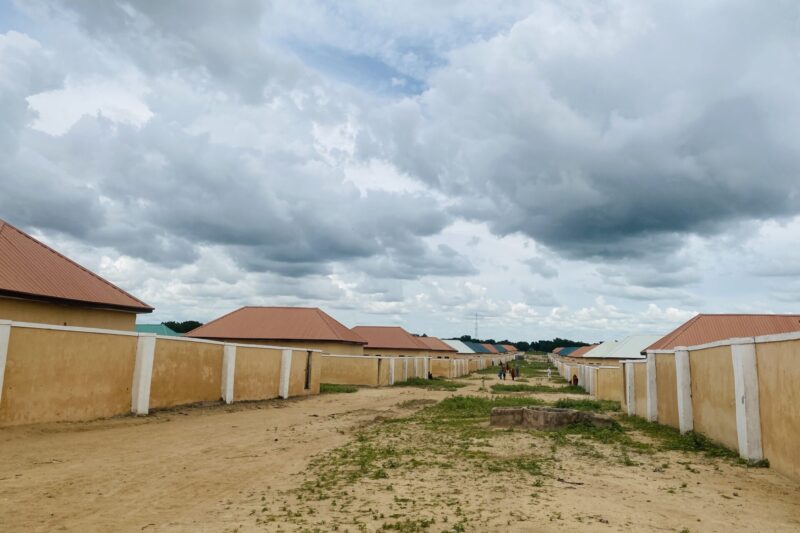Increased attacks by insurgents – including kidnappings – lack of good schools, unemployment and skyrocketing food and transport costs make it difficult to survive in resettled communities.
Growing insecurity and economic hardship are driving recently resettled people to return to internally displaced persons’ camps and host communities in and around Maiduguri, the capital of Borno State.
They say attacks by insurgents – including kidnapping for ransom – lack of good schools providing Western education, unemployment and skyrocketing food and transport costs are making it extremely difficult to remain in resettled communities.
Babagana Umara Zulum, the governor of Borno State, recently reiterated his administration’s commitment to resettling displaced persons in a dignified and sustainable manner in their ancestral hometowns which they fled at the peak of what he described as the “Boko Haram insurgency”.
He emphasised the unsustainability of prolonged stays in IDP camps, citing donor fatigue as a pressing concern.
The government has repeatedly expressed its intent to close all IDP camps in the state by 2027, aiming to find lasting solutions by returning displaced persons to their place of origin or supporting them to resettle in host communities.
Zulum said it was time to put an end to displaced persons’ dependency on camp life.
Nine months ago, the government resettled thousands of displaced persons – who were taking refuge in the Kawar Maila camp in Shehuri North, Maiduguri – into newly built housing estates in Dalori in the Konduga Local Government Area of Borno State. The town is about 15km southeast of the capital.
Kawar Maila IDP camp was closed and more than 2,500 displaced persons – mostly originally from the Konduga and Bama districts – were resettled in Dalori.
At the time, displaced persons said they were delighted to “return home”.
But now, nine months later, the resettled residents are leaving Dalori and returning to the city.
Hauwa Musa, a widow and mother of three, said she could not “make ends meet” in Dalori.
“I returned to the Kawar Maila community. There is no profitable business in Dalori. As a widow with children, I have to find a way to survive. If I had enough money to set up a good business in Dalori, I would go back immediately. But I do not have the means.”
Hauwa also complained about insecurity.
“Although there are security personnel in the town, insurgents still manage to carry out attacks. And recently, attacks have increased. Kidnapping is a major concern. Insurgents take men, women and even children and then demand huge ransoms. About two weeks before I left Dalori, insurgents kidnapped at least eight to 10 people. Only three had been released by the time I left.”
She said she did not know if the insurgents were members of the Jamā’at Ahl as-Sunnah lid-Da’way Wa’l-Jihād (JAS), more commonly referred to as Boko Haram, or the Islamic State West Africa Province (ISWAP), adding that it was difficult to distinguish between the two groups.
Hauwa said nearly half the resettled population had returned to Maiduguri because of the hardships they were experiencing and insecurity.
A pregnant woman, who asked to remain anonymous, said the healthcare facility in Dalori lacked the necessary drugs for patients and the schools did not provide “proper Western education”.
She said without capital, it was difficult to start and maintain a business.
“Some people farm but the income is not enough to cover a family’s daily needs.”
Bulama Mohammed Tijjani, a representative of the displaced residents, told RNI: “Initially, women were able to engage in small businesses, such as selling roasted peanuts, sachets of water and charcoal. But now, many cannot continue because they lack capital.
“And increased kidnappings are a problem. For instance, an elderly man named Baa Malum was kidnapped recently. Insurgents demanded ₦500,000 for his release. We ended up contributing food items and ₦400,000 cash to secure his release. Living in Dalori has become terrifying and that is why so many people have left the town and have returned to the city.”
Tijjani criticised the lack of coordination between security forces in Dalori, saying: “If the Civilian Joint Task Force [CJTF] and the police collaborated effectively, the situation would be better for everyone.”
Mohammed Jidda, a CJTF member, said: “It is true that people from the town are relocating to Maiduguri because of the threat of insurgents. But the insurgents do not kidnap people within Dalori town. It is those people who go into the bushes or to remote farmlands on the outskirts of Konduga who have been kidnapped.
“We have reported these incidents to the military but we are still waiting for reinforcements. In future, security personnel will accompany residents who go to their farms or to collect firewood in the bushes.”
AYSHA MUSTAPHA KOLOMI








